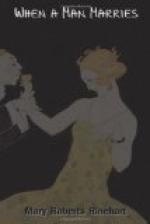“Very well,” I said, much offended. “After this I shall sit with Flannigan in the kitchen. He is the only gentleman in the house.”
I left him babbling apologies and went to bed, but I had an uncomfortable feeling that Bella had been a witness to our conversation, for the door into Aunt Selina’s room closed softly as I passed.
I knew beforehand that I was not going to sleep. The instant I turned out the light the nightmare events of the evening ranged themselves in a procession, or a series of tableaus, one after the other; Flannigan on the roof, with the bracelet on his palm, looking accusingly at me; Mr. Harbison and the scene on the roof, with my flippancy; and the result of that flippancy—the man on the stairs, the arms that held me, the terrible kisses that had scorched my lips—it was awful! And then the absurd situation across Aunt Selina’s bed, and Bella’s face! Oh, it was all so ridiculous—my having thought that the Harbison man was a gentleman, and finding him a cad, and worse. It was excruciatingly funny. I quite got a headache from laughing; indeed I laughed until I found I was crying, and then I knew I was going to have an attack of strangulated emotion, called hysteria. So I got up and turned on all the lights, and bathed my face with cologne, and felt better.
But I did not go to sleep. When the hall clock chimed two, I discovered I was hungry. I had had nothing since luncheon, and even the thirst following the South American goulash was gone. There was probably something to eat in the pantry, and if there was not, I was quite equal to going to the basement.
As it happened, however, I found a very orderly assortment of left-overs and a pitcher of milk, which had no business there in the pantry, and with plenty of light I was not at all frightened.
I ate bread and butter and drank milk, and was fast becoming a rational person again; I had pulled out one of the drawers part way, and with a tray across the corner I had improvised a comfortable seat. And then I noticed that the drawer was full of soiled napkins, and I remembered the bracelet. I hardly know why I decided to go through the drawer again, after Flannigan had already done it, but I did. I finished my milk and then, getting down on my knees, I proceeded systematically to empty the drawer. I took out perhaps a dozen napkins and as many doilies without finding anything. Then I took out a large tray cloth, and there was something on it that made me look farther. One corner of it had been scorched, the clear and well defined imprint of a lighted cigarette or cigar, a blackened streak that trailed off into a brown and yellow. I had a queer, trembly feeling, as if I were on the brink of a discovery—perhaps Anne’s pearls, or the cuff buttons with storks painted on china in the center. But the only thing I found, down in the corner of the drawer, was a half-burned cigarette.
To me, it seemed quite enough. It was one of the South American cigarettes, with a tobacco wrapper instead of paper, that Mr. Harbison smoked.




